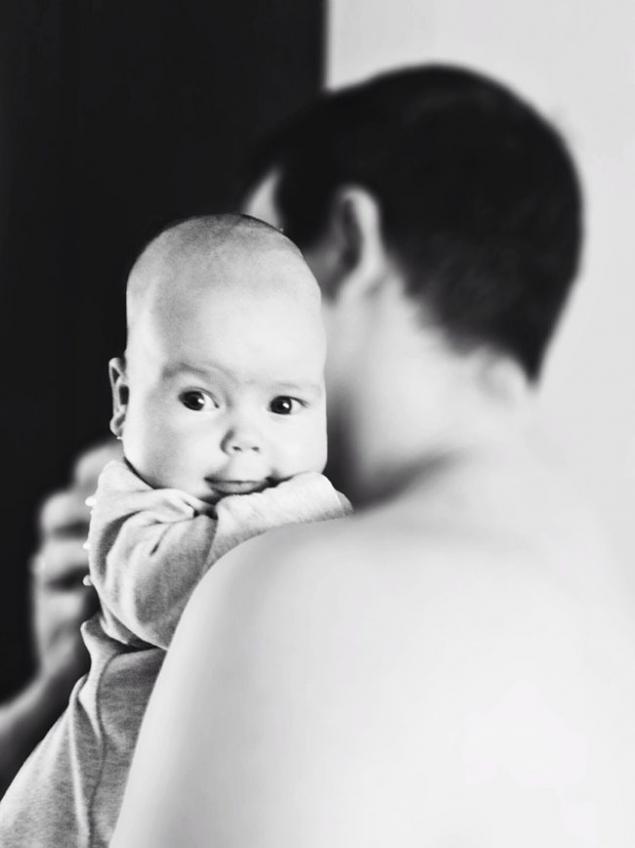After three late: parenting advice from the Japanese teacher Masaru Ibuka
 Bashny.Net
Bashny.Net
"Since ancient times it is believed that outstanding talent is first of all inheritance, a freak of nature. Code we are told that Mozart gave his first concert at the age of three years or that John Stuart mill read classic literature in Latin at the same age, the majority responds: "of Course, they're geniuses".
However, a detailed analysis of the early years of life and Mozart and Milla says that they were strictly brought up by fathers who wanted to make their children outstanding. I assume that neither Mozart nor mill were not born geniuses, their talent developed to the maximum due to the fact that it with early childhood, have created favorable conditions and given a wonderful education."

So begins world-renowned work in pediatric psychology outstanding Japanese teacher Masaru Ibuka "After three too late". In his Foreword to this book the Director of the Institute for the development of human potential of all American Glen Doman wrote: "I think that this book is one of the most important books ever written. And I think its a must read for all who live on Earth parents". And that's the truth, after reading this work you'll likely are much more aware of your baby, even if he is not able to speak and will be able to avoid many mistakes.
We decided to acquaint you with some quotes that we think reveal the essence of the ideas of Masaru Ibuka.
"Education and the environment, which gets the baby immediately after birth, determines what he will become human or wolf!"
"The key to the development of mental abilities — it is a personal perception and experiences during the first three years of life, i.e. during the development of brain cells. No child is born a genius, and no one is a fool. It all depends on stimulation and the extent of brain development in the crucial years of a child's life. The years from birth to age three. In the kindergarten to educate too late."
"All men, if they do not have physical disabilities, are born about the same. Responsible for the division of children into wise and foolish goals and lies down on aggressive parenting."
"The main goal of early development is to prevent poor children".
"The period when communication between cells formed the most active, is the period from birth to three years. At this time originates approximately 70-80% of such compounds. And as they develop, increase possibilities of the brain. In the first six months after birth, the brain reaches 50% of its adult capacity, and to three years — 80%. If in the first three years formed a solid base, it is useless to learn how to use it. It's like trying to achieve good results, working on a bad computer."
"The child under three years is not difficult to learn what interests him, and you should not worry about the amount of energy and effort spent."
"When the mind formed the sample of the native language, is difficult to accept the examples of others. However, the brain of a child under three years old are capable of learning a system of thought not only of his native language, but any other, and this process can go at the same time. Therefore, children at that age without much difficulty unable to speak any language like a native".
"It is because of the environment and the life experiences of children are identical at birth, grow up with different abilities and character".
"To teach a child to roller skate after he learned to walk, extremely difficult, and at about the same time when he learns to walk, and after a couple of months he will make a great skater".
What is dangerous baby-sitting with poor knowledge of the native language even for babies.
"A young man sent to work abroad, his wife and baby girl went to live with his parents in Tohoku. Grandfather and grandmother loved her granddaughter, played a lot and talked to her. A year later, after the case, the young man returned, and he and his wife and child again settled in Tokyo. While their girl was still too young to speak. But when she spoke, the parents were confused: all the words uttered by their daughter, was in the dialect of Tohoku. It was very strange because all family members spoke a common Japanese language, and the only daughter — in dialect. Even after a few years, when the girl went to school, she still could not get rid of your accent Tohoku.
It turned out that even before the child has learned to speak this dialect spread through the channels of his brain. And when the trail already formed, it is extremely difficult to erase them to begin to lay a new one".
The room, devoid of stimulants is harmful to the baby.
"Experiments conducted by Professor Bruner in America, showed that the degree of external influence the environment in which there is a small child, has a significant impact on the development of children's intelligence. He proved this in the following studies. First, he divided the group of newborns to 2 parts, by placing one in conditions completely devoid of stimulants, and the other is in a room with bright colorful Wallpaper, colorful ceiling colorful blankets where the window was visible as doctors and nurses. There's even music was playing.
Both groups were raised in different conditions for several months, after which he was conducted tests to determine intellectual development. Each child was offered a shiny object, and at the time that he needed to get to this subject, determined the level of its development. The results showed clear differences: the level of intelligence in children who were in the empty, bare room behind for three months from the level of intelligence of the children from the room with a stimulating environment."
The child is influenced by the most unexpected things.
"Carl Friedrich Gauss, one of the greatest mathematicians of the nineteenth century, discovered the formula of sum of an arithmetic series when he was only 8 years old.
Father Gauss did not differ by scholarship. He was a Mason, repairing walls, fences, fireplaces and often took his son with him to work. Gauss gave the father the bricks and count them. Apparently, the mathematical ability of Gauss was formed under the influence of this habit in early childhood".

Tips for parents from Masaru Ibuka:
Often take the child in his arms.
Don't be afraid to take the baby with you in bed.
Never ignore a baby crying.
Not Lisp with the child.
Don't ridicule your child in front of others.
Telling the truth on sexual subjects.
Surround young children the best that you have.
Give your child pencils as early as possible.
Do not force the will of the baby. published
P. S. And remember, only by changing their consumption — together we change the world! © Join us at Facebook , Vkontakte, Odnoklassniki
Source: dochkimateri.com/sections/health/2038-pust-vash-rebenok-budet-luchshe-vas-sovety-genialnogo-yaponskogo-psihologa-masaru-ibuki-avtora-bestsellera-posle-treh-uzhe-pozdn
However, a detailed analysis of the early years of life and Mozart and Milla says that they were strictly brought up by fathers who wanted to make their children outstanding. I assume that neither Mozart nor mill were not born geniuses, their talent developed to the maximum due to the fact that it with early childhood, have created favorable conditions and given a wonderful education."

So begins world-renowned work in pediatric psychology outstanding Japanese teacher Masaru Ibuka "After three too late". In his Foreword to this book the Director of the Institute for the development of human potential of all American Glen Doman wrote: "I think that this book is one of the most important books ever written. And I think its a must read for all who live on Earth parents". And that's the truth, after reading this work you'll likely are much more aware of your baby, even if he is not able to speak and will be able to avoid many mistakes.
We decided to acquaint you with some quotes that we think reveal the essence of the ideas of Masaru Ibuka.
"Education and the environment, which gets the baby immediately after birth, determines what he will become human or wolf!"
"The key to the development of mental abilities — it is a personal perception and experiences during the first three years of life, i.e. during the development of brain cells. No child is born a genius, and no one is a fool. It all depends on stimulation and the extent of brain development in the crucial years of a child's life. The years from birth to age three. In the kindergarten to educate too late."
"All men, if they do not have physical disabilities, are born about the same. Responsible for the division of children into wise and foolish goals and lies down on aggressive parenting."
"The main goal of early development is to prevent poor children".
"The period when communication between cells formed the most active, is the period from birth to three years. At this time originates approximately 70-80% of such compounds. And as they develop, increase possibilities of the brain. In the first six months after birth, the brain reaches 50% of its adult capacity, and to three years — 80%. If in the first three years formed a solid base, it is useless to learn how to use it. It's like trying to achieve good results, working on a bad computer."
"The child under three years is not difficult to learn what interests him, and you should not worry about the amount of energy and effort spent."
"When the mind formed the sample of the native language, is difficult to accept the examples of others. However, the brain of a child under three years old are capable of learning a system of thought not only of his native language, but any other, and this process can go at the same time. Therefore, children at that age without much difficulty unable to speak any language like a native".
"It is because of the environment and the life experiences of children are identical at birth, grow up with different abilities and character".
"To teach a child to roller skate after he learned to walk, extremely difficult, and at about the same time when he learns to walk, and after a couple of months he will make a great skater".
What is dangerous baby-sitting with poor knowledge of the native language even for babies.
"A young man sent to work abroad, his wife and baby girl went to live with his parents in Tohoku. Grandfather and grandmother loved her granddaughter, played a lot and talked to her. A year later, after the case, the young man returned, and he and his wife and child again settled in Tokyo. While their girl was still too young to speak. But when she spoke, the parents were confused: all the words uttered by their daughter, was in the dialect of Tohoku. It was very strange because all family members spoke a common Japanese language, and the only daughter — in dialect. Even after a few years, when the girl went to school, she still could not get rid of your accent Tohoku.
It turned out that even before the child has learned to speak this dialect spread through the channels of his brain. And when the trail already formed, it is extremely difficult to erase them to begin to lay a new one".
The room, devoid of stimulants is harmful to the baby.
"Experiments conducted by Professor Bruner in America, showed that the degree of external influence the environment in which there is a small child, has a significant impact on the development of children's intelligence. He proved this in the following studies. First, he divided the group of newborns to 2 parts, by placing one in conditions completely devoid of stimulants, and the other is in a room with bright colorful Wallpaper, colorful ceiling colorful blankets where the window was visible as doctors and nurses. There's even music was playing.
Both groups were raised in different conditions for several months, after which he was conducted tests to determine intellectual development. Each child was offered a shiny object, and at the time that he needed to get to this subject, determined the level of its development. The results showed clear differences: the level of intelligence in children who were in the empty, bare room behind for three months from the level of intelligence of the children from the room with a stimulating environment."
The child is influenced by the most unexpected things.
"Carl Friedrich Gauss, one of the greatest mathematicians of the nineteenth century, discovered the formula of sum of an arithmetic series when he was only 8 years old.
Father Gauss did not differ by scholarship. He was a Mason, repairing walls, fences, fireplaces and often took his son with him to work. Gauss gave the father the bricks and count them. Apparently, the mathematical ability of Gauss was formed under the influence of this habit in early childhood".

Tips for parents from Masaru Ibuka:
Often take the child in his arms.
Don't be afraid to take the baby with you in bed.
Never ignore a baby crying.
Not Lisp with the child.
Don't ridicule your child in front of others.
Telling the truth on sexual subjects.
Surround young children the best that you have.
Give your child pencils as early as possible.
Do not force the will of the baby. published
P. S. And remember, only by changing their consumption — together we change the world! © Join us at Facebook , Vkontakte, Odnoklassniki
Source: dochkimateri.com/sections/health/2038-pust-vash-rebenok-budet-luchshe-vas-sovety-genialnogo-yaponskogo-psihologa-masaru-ibuki-avtora-bestsellera-posle-treh-uzhe-pozdn
Tags
See also
The differences in the education of the "wild" tribes and the "civilized" society from birth. Part 1
Advice on parenting
5 parenting advice from mom-millionaire. Program the child for success!
Wise advice about parenting that every mother should know!
How to raise children in Italy
Children who are brought up TV
The concept of peace
EASY-child: The common goal of education
Michael Khas'minskii: Families split about selfishness
Keep away from children! The neuropsychologist about the dangers of early development

















